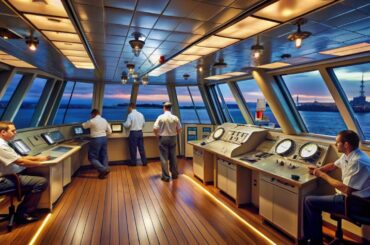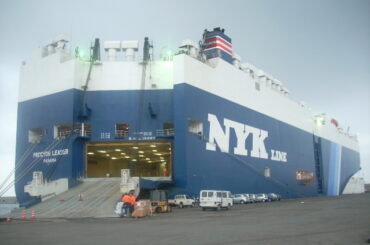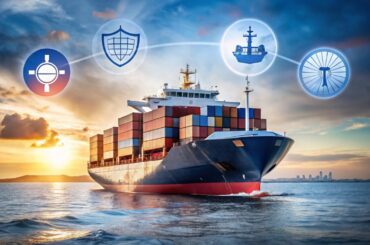On ships, boilers play a vital role in powering essential systems and propulsion through the generation of steam. Their functionality goes beyond mere heat production, impacting fuel efficiency and emissions control. Understanding why boilers are indispensable at sea involves exploring their intricate relationship with maritime operations and the advancements driving sustainability. Stay tuned to unravel the intricacies of why these mechanical workhorses remain a cornerstone of maritime technology.
Importance of Boilers in Maritime Industry
Boilers play an essential role in the maritime industry, serving as the heart of a ship’s propulsion system. The efficiency of boilers on ships is vital for steam generation, which is the primary source of power for propulsion and various onboard systems.
Boiler efficiency directly impacts fuel consumption, emissions, and overall performance of the vessel. To guarantee peak boiler efficiency, regular maintenance, monitoring, and adherence to safety protocols are imperative.
Proper combustion control, water treatment, and heat recovery systems contribute greatly to enhancing efficiency and prolonging the lifespan of the boiler.
Steam generation in boilers is a complex process that requires precise control of temperature, pressure, and fuel-air mixture.
Modern boilers on ships are equipped with advanced automation systems that monitor and regulate these parameters to achieve maximum efficiency and safety.
Functions of Boilers on Ships
Within the maritime industry, the functioning of boilers on ships is essential to the vessel’s operations and performance. Boilers play a significant role in generating steam, which is used for various applications on board. One of the primary functions of boilers is steam generation, where water is heated to produce high-pressure steam that powers turbines for propulsion or drives auxiliary machinery.
Moreover, boilers enhance the thermal efficiency of a ship by utilizing waste heat from the exhaust gases to preheat the feedwater. This process increases the overall efficiency of the vessel’s power plant by reducing fuel consumption and operating costs.
Thermal efficiency is imperative for optimizing fuel usage and reducing environmental impact.
Types of Boilers Used at Sea
To guarantee efficient operation and performance on ships, understanding the various types of boilers used at sea is essential.
Two main types of boilers commonly found on ships are fire tube boilers and water tube boilers. Fire tube boilers have a lower water storage capacity and are usually used for smaller vessels. They consist of a horizontal cylinder with a single pass of tubes running through it. The hot gases produced by the burner pass through these tubes, transferring heat to the water surrounding them.
On the other hand, water tube boilers are more common on larger ships due to their higher efficiency and capacity. Water tube boilers have water-filled tubes that circulate through a boiler heated by combustion gases. This design allows for a higher heat transfer rate and better steam quality.
Understanding the differences between fire tube boilers and water tube boilers is vital for maintaining and operating the boiler systems efficiently at sea.
Boiler Maintenance and Safety Protocols
Ensuring the proper maintenance and adherence to safety protocols is paramount for the ideal functioning of ship boilers. Regular boiler inspections are vital to prevent potential malfunctions that could lead to catastrophic accidents at sea.
Inspection intervals should be determined based on the boiler type, usage, and manufacturer recommendations. During inspections, focus on key components like the burner, controls, safety devices, and water level. Any signs of wear, leaks, or abnormal operation should be promptly addressed by qualified personnel.
Safety protocols must be strictly followed to protect both personnel and the ship. Regular training on boiler operation and emergency procedures is important.
Additionally, maintaining fuel efficiency isn’t only cost-effective but also environmentally responsible. Proper combustion, insulation, and heat recovery systems contribute to maximizing fuel efficiency, reducing costs, and minimizing the vessel’s carbon footprint.
Implementing a thorough maintenance and safety plan guarantees smooth boiler operation, extends equipment lifespan, and enhances overall safety on board.
Future Innovations in Ship Boilers
Innovations in ship boilers are continuously evolving to meet the demands of modern maritime operations.
To keep up with the ever-changing landscape, sustainable technologies and automation advancements are at the forefront of future developments in ship boilers.
Future Innovations in Ship Boilers:
- Eco-Friendly Fuel Options: The integration of sustainable technologies such as biofuels, LNG, and hydrogen is gaining traction to reduce emissions and comply with stringent environmental regulations.
- Advanced Control Systems: Automation advancements are enhancing the efficiency and safety of ship boilers through the implementation of smart sensors, predictive maintenance algorithms, and remote monitoring capabilities.
- Hybrid Boiler Systems: Combining traditional boiler technology with renewable energy sources like solar or wind power to create more energy-efficient and environmentally friendly solutions.
- Heat Recovery Systems: Utilizing waste heat recovery technologies to improve overall thermal efficiency and reduce fuel consumption, making ship boilers more sustainable and cost-effective in the long run.
Frequently Asked Questions
How Do Boilers on Ships Differ From Household Boilers?
Household boilers are designed for smaller-scale heating, using gas or electricity. In contrast, ship boilers are larger, employing different fuel sources like oil or coal. Maintenance practices vary due to scale and complexity of marine boiler types.
Are There Specific Regulations for Boiler Installations on Ships?
When installing boilers on ships, it’s essential to adhere to stringent regulations governing boiler safety and regulatory compliance. Failure to comply can result in serious consequences. Always guarantee installations meet maritime standards for operational integrity and crew safety.
What Are the Common Fuel Sources Used in Ship Boilers?
When considering marine fuel for ship boilers, common options include diesel oil, heavy fuel oil, and liquefied natural gas. Different boiler types cater to these fuels, ensuring efficient combustion and power generation for maritime operations.
Can Boilers on Ships Be Used for Heating Purposes?
Yes, boilers on ships can be used for heating purposes. Different boiler types are equipped to provide heating systems onboard vessels. They utilize various fuel sources efficiently to generate heat for cabins, cargo, or other spaces, ensuring comfort and functionality.
How Do Boilers Impact the Overall Efficiency of a Ship?
Boilers play a critical role in ship efficiency by generating steam for propulsion, electricity, and heating. Proper boiler maintenance and operation contribute to overall ship performance. Monitoring boiler efficiency is essential for fuel savings and environmental impact reduction.





